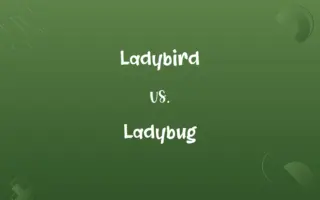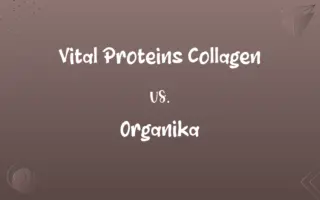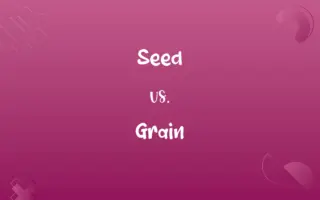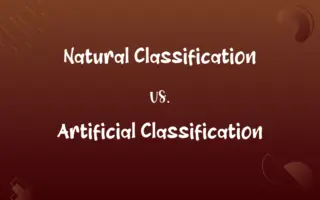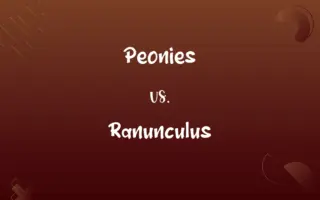Organic vs. Inorganic: Know the Difference

By Shumaila Saeed || Updated on December 25, 2023
Organic compounds contain carbon and are typically found in living organisms, whereas inorganic compounds do not contain carbon-hydrogen bonds and are often minerals or metals.
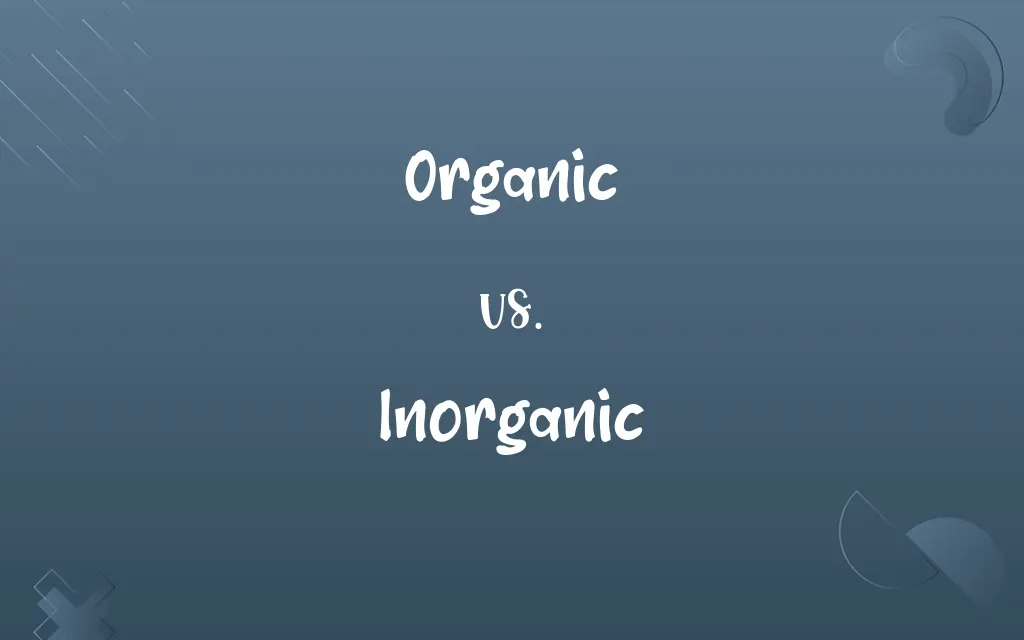
Key Differences
Organic chemistry focuses on compounds that contain carbon, especially those involved in the chemistry of life. Inorganic chemistry deals with compounds that do not contain carbon-hydrogen bonds, often including metals, minerals, and gases.
Shumaila Saeed
Nov 15, 2023
Organic compounds are often associated with living organisms and their biological processes. Inorganic compounds are typically found in the Earth's crust, oceans, and atmosphere, and are not associated with living organisms.
Shumaila Saeed
Nov 15, 2023
Organic compounds are known for their complexity, often forming large and intricate molecules like proteins and DNA. Inorganic compounds, while diverse, are usually simpler in structure compared to organic molecules.
Shumaila Saeed
Nov 15, 2023
Organic chemistry is essential in processes like photosynthesis, respiration, and the formation of fossil fuels. Inorganic chemistry plays a crucial role in geological formations, industrial processes, and catalysis.
Shumaila Saeed
Nov 15, 2023
Organic compounds are used in pharmaceuticals, agriculture, and plastics, reflecting their biological origin. Inorganic compounds find applications in materials science, electronics, and catalysis, often in non-biological contexts.
Shumaila Saeed
Nov 15, 2023
ADVERTISEMENT
Comparison Chart
Composition
Contain carbon-hydrogen bonds
Do not contain carbon-hydrogen bonds
Shumaila Saeed
Nov 15, 2023
Role in Nature
Crucial for life processes
Important in geological and industrial processes
Shumaila Saeed
Nov 15, 2023
Applications
Pharmaceuticals, plastics, agriculture
Electronics, materials, catalysis
Shumaila Saeed
Nov 15, 2023
ADVERTISEMENT
Organic and Inorganic Definitions
Organic
In chemistry, organic pertains to carbon-based molecules, especially those found in living systems.
The study of organic molecules is crucial in understanding biological processes.
Shumaila Saeed
Nov 15, 2023
Inorganic
Inorganic refers to chemical compounds that generally do not contain carbon-hydrogen bonds.
Inorganic salts are essential in various industrial processes.
Shumaila Saeed
Nov 15, 2023
Organic
Organic in food labeling indicates adherence to specific cultivation and processing standards.
Organic milk comes from cows not treated with hormones or antibiotics.
Shumaila Saeed
Nov 15, 2023
Inorganic
Inorganic materials often include metals, minerals, and synthetic compounds.
The bridge was constructed using various inorganic materials for durability.
Shumaila Saeed
Nov 15, 2023
ADVERTISEMENT
Inorganic
Inorganic fertilizers are made from synthetic or mined substances, not from organic matter.
Inorganic fertilizers provide quick nutrients to plants but can impact soil health.
Shumaila Saeed
Nov 15, 2023
Inorganic
Inorganic chemistry focuses on substances not derived from living organisms.
Inorganic compounds, like metals and minerals, are abundant in nature.
Shumaila Saeed
Nov 15, 2023
Organic
Of, marked by, or involving the use of fertilizers or pesticides that are strictly of animal or vegetable origin
Organic vegetables.
An organic farm.
Shumaila Saeed
Oct 19, 2023
Inorganic
Inorganic growth in business refers to expansion through acquisitions or mergers.
The company's inorganic growth strategy involved acquiring several smaller firms.
Shumaila Saeed
Nov 15, 2023
Organic
Raised or conducted without the use of drugs, hormones, or synthetic chemicals
Organic chicken.
Organic cattle farming.
Shumaila Saeed
Oct 19, 2023
Inorganic
(Chemistry) Of or relating to compounds not containing hydrocarbon groups or derivatives.
Shumaila Saeed
Oct 19, 2023
Organic
Resembling a living organism in organization or development; interconnected
Society as an organic whole.
Shumaila Saeed
Oct 19, 2023
Organic
(Law) Denoting or relating to the fundamental or constitutional laws and precepts of a government or an organization.
Shumaila Saeed
Oct 19, 2023
Inorganic
Not organic; without the organs necessary for life; devoid of an organized structure; unorganized; lifeness; inanimate.
Shumaila Saeed
Oct 19, 2023
Organic
A substance, especially a fertilizer or pesticide, of animal or vegetable origin.
Shumaila Saeed
Oct 19, 2023
Inorganic
Of or pertaining to compounds that are not derivatives of hydrocarbons; not organic{5}.
Shumaila Saeed
Oct 19, 2023
Inorganic
Relating or belonging to the class of compounds not having a carbon basis;
Hydrochloric and sulfuric acids are called inorganic substances
Shumaila Saeed
Oct 19, 2023
Organic
(chemistry) Relating to the compounds of carbon, relating to natural products.
Shumaila Saeed
Oct 19, 2023
Organic
(agriculture) Of food or food products, grown in an environment free from artificial agrichemicals, and possibly certified by a regulatory body.
Shumaila Saeed
Oct 19, 2023
Organic
(sociology) Describing a form of social solidarity theorized by Emile Durkheim that is characterized by voluntary engagements in complex interdependencies for mutual benefit (such as business agreements), rather than mechanical solidarity, which depends on ascribed relations between people (as in a family or tribe).
Shumaila Saeed
Oct 19, 2023
Organic
(military) Of a military unit or formation, or its elements, belonging to a permanent organization (in contrast to being temporarily attached).
Shumaila Saeed
Oct 19, 2023
Organic
Instrumental; acting as instruments of nature or of art to a certain destined function or end.
Shumaila Saeed
Oct 19, 2023
Organic
Generated according to the ranking algorithms of a search engine, as opposed to paid placement by advertisers.
Shumaila Saeed
Oct 19, 2023
Organic
Developing in a gradual or natural fashion.
The writing of the script was an organic process.
Shumaila Saeed
Oct 19, 2023
Organic
Harmonious; coherent; structured.
The production came together in an organic whole.
Shumaila Saeed
Oct 19, 2023
Organic
(science fiction) A living organism, as opposed to a robot or hologram.
Shumaila Saeed
Oct 19, 2023
Organic
Of or pertaining to an organ or its functions, or to objects composed of organs; consisting of organs, or containing them; as, the organic structure of animals and plants; exhibiting characters peculiar to living organisms; as, organic bodies, organic life, organic remains. Cf. Inorganic.
Shumaila Saeed
Oct 19, 2023
Organic
Instrumental; acting as instruments of nature or of art to a certain destined function or end.
Those organic arts which enable men to discourse and write perspicuously.
Shumaila Saeed
Oct 19, 2023
Organic
Of or pertaining to compounds which are derivatives of hydrocarbons; pertaining to, or denoting, any one of a large series of carbon-containing compounds which are related to the carbon compounds produced by biological processes (such as methane, oils, fats, sugars, alcohols, ethers, proteins, etc.) and include many substances of artificial production which may or may not occur in animals or plants; - contrasted with inorganic.
Shumaila Saeed
Oct 19, 2023
Organic
Relating or belonging to the class of chemical compounds having a carbon basis;
Hydrocarbons are organic compounds
Shumaila Saeed
Oct 19, 2023
Organic
Being or relating to or derived from or having properties characteristic of living organisms;
Organic life
Organic growth
Organic remains found in rock
Shumaila Saeed
Oct 19, 2023
Organic
Involving or affecting physiology or bodily organs;
An organic disease
Shumaila Saeed
Oct 19, 2023
Organic
Of or relating to foodstuff grown or raised without synthetic fertilizers or pesticides or hormones;
Organic eggs
Organic vegetables
Organic chicken
Shumaila Saeed
Oct 19, 2023
Organic
Constitutional in the structure of something (especially your physical makeup)
Shumaila Saeed
Oct 19, 2023
Organic
Organic refers to compounds containing carbon, typically derived from living organisms.
Organic farming avoids synthetic chemicals, using natural methods instead.
Shumaila Saeed
Nov 15, 2023
Organic
Organic products are derived from natural sources, often without artificial additives or processes.
She prefers organic fruits due to their lack of pesticides.
Shumaila Saeed
Nov 15, 2023
Organic
Organic growth refers to natural development, without external aids or acquisitions.
The company's organic growth was impressive, relying solely on internal resources.
Shumaila Saeed
Nov 15, 2023
Repeatedly Asked Queries
What is organic chemistry?
Organic chemistry studies carbon-containing compounds, primarily those involved in life processes.
Shumaila Saeed
Nov 15, 2023
What are examples of organic compounds?
Organic compounds include sugars, proteins, and hydrocarbons.
Shumaila Saeed
Nov 15, 2023
What is inorganic chemistry?
Inorganic chemistry deals with compounds not based on carbon-hydrogen bonds, including metals and minerals.
Shumaila Saeed
Nov 15, 2023
Are all living things organic?
Yes, all living organisms are made up of organic compounds.
Shumaila Saeed
Nov 15, 2023
Do organic compounds always come from nature?
Most organic compounds are derived from living organisms, but they can also be synthesized in laboratories.
Shumaila Saeed
Nov 15, 2023
Can inorganic compounds be part of living organisms?
Yes, inorganic compounds like water and minerals are essential to living organisms.
Shumaila Saeed
Nov 15, 2023
Are inorganic substances always synthetic?
Not necessarily. Inorganic substances can be both naturally occurring and synthetic.
Shumaila Saeed
Nov 15, 2023
Are all carbon-containing compounds organic?
No, compounds like carbonates and oxides, despite containing carbon, are considered inorganic.
Shumaila Saeed
Nov 15, 2023
Is carbon dioxide organic or inorganic?
Despite containing carbon, carbon dioxide is considered inorganic as it lacks carbon-hydrogen bonds.
Shumaila Saeed
Nov 15, 2023
What are examples of inorganic compounds?
Inorganic compounds include water, salts, and metals.
Shumaila Saeed
Nov 15, 2023
Is organic food healthier?
Organic food is often perceived as healthier due to the absence of synthetic pesticides and fertilizers, though nutritional differences can vary.
Shumaila Saeed
Nov 15, 2023
Can inorganic chemistry involve living processes?
Inorganic chemistry is essential in many biological processes but does not directly involve organic molecules.
Shumaila Saeed
Nov 15, 2023
Are inorganic materials used in medicine?
Yes, inorganic materials are used in various medical applications, including diagnostics and implants.
Shumaila Saeed
Nov 15, 2023
What is the environmental impact of organic practices?
Organic practices aim to reduce environmental impact by avoiding synthetic chemicals and promoting biodiversity.
Shumaila Saeed
Nov 15, 2023
How do inorganic substances affect the environment?
Inorganic substances can have diverse environmental impacts, from essential nutrients to pollutants.
Shumaila Saeed
Nov 15, 2023
Can organic compounds be toxic?
Yes, some organic compounds, like certain toxins produced by organisms, can be harmful.
Shumaila Saeed
Nov 15, 2023
Are inorganic compounds always non-toxic?
No, many inorganic compounds can be toxic, such as heavy metals and certain gases.
Shumaila Saeed
Nov 15, 2023
How do organic fertilizers differ from inorganic?
Organic fertilizers are derived from natural sources like compost, while inorganic fertilizers are chemically synthesized.
Shumaila Saeed
Nov 15, 2023
What role do inorganic compounds play in technology?
Inorganic compounds are crucial in various technologies, including electronics, energy storage, and construction.
Shumaila Saeed
Nov 15, 2023
How does organic chemistry impact medicine?
Organic chemistry is fundamental in pharmaceutical development, drug design, and understanding biological mechanisms.
Shumaila Saeed
Nov 15, 2023
Share this page
Link for your blog / website
HTML
Link to share via messenger
About Author
Written by
Shumaila SaeedShumaila Saeed, an expert content creator with 6 years of experience, specializes in distilling complex topics into easily digestible comparisons, shining a light on the nuances that both inform and educate readers with clarity and accuracy.


